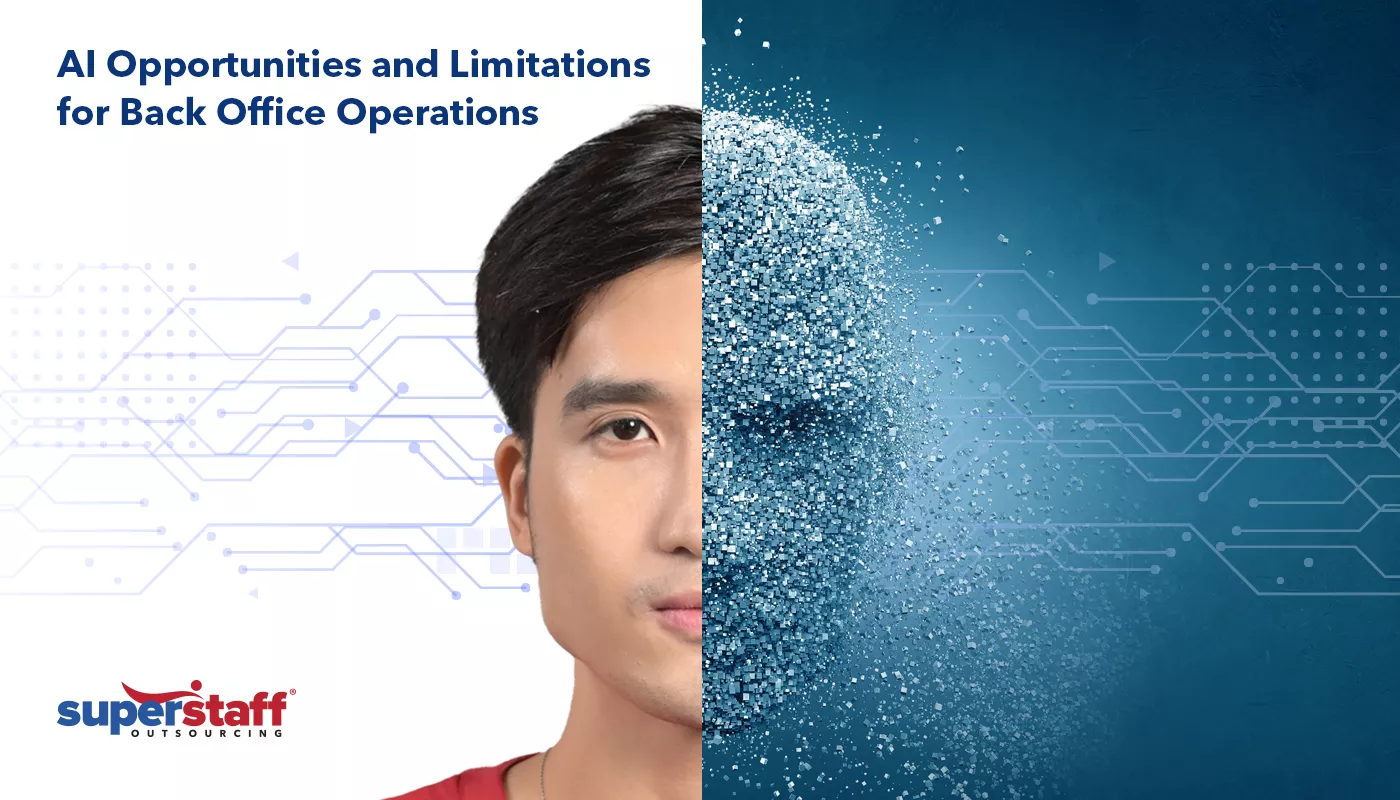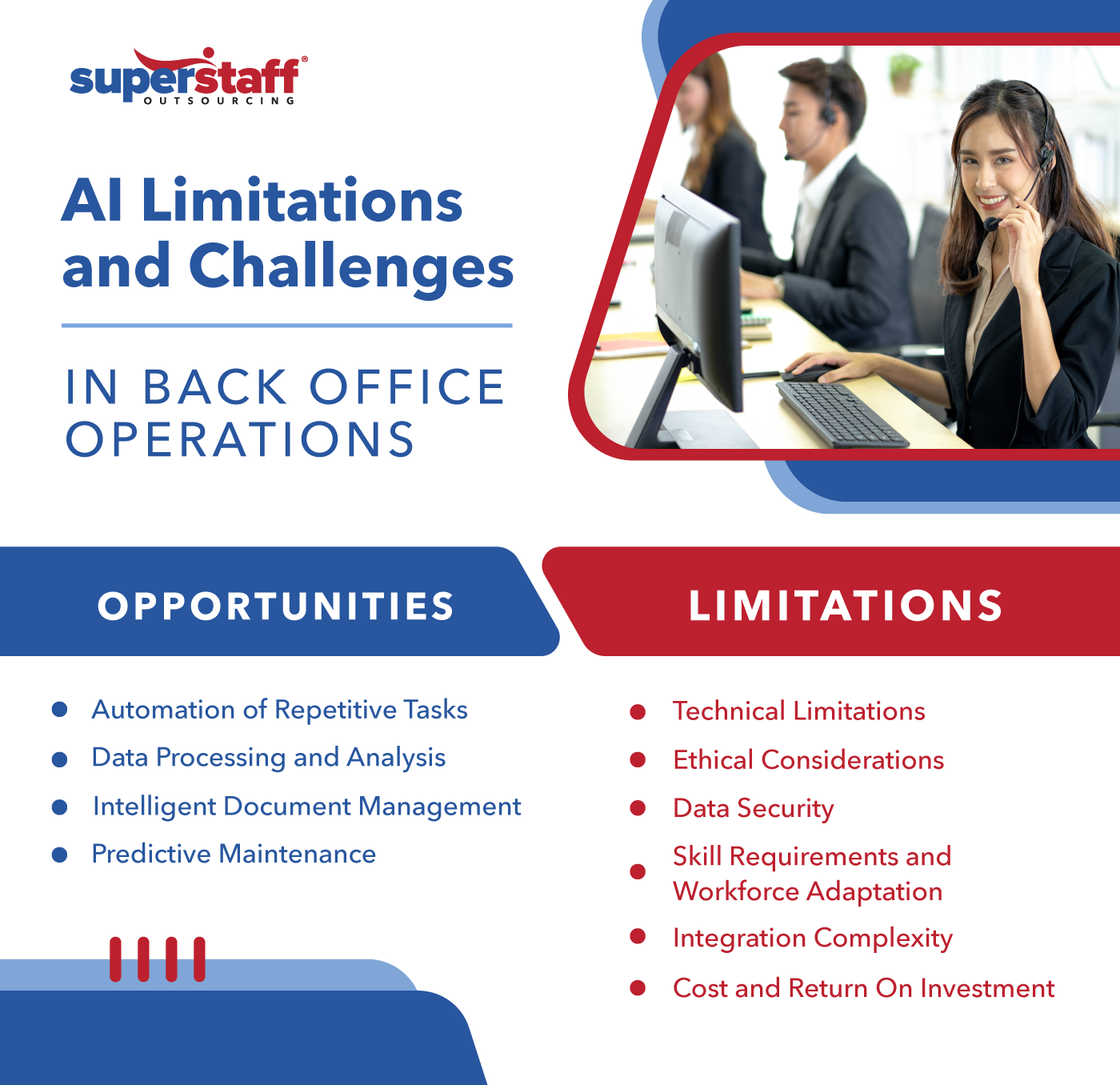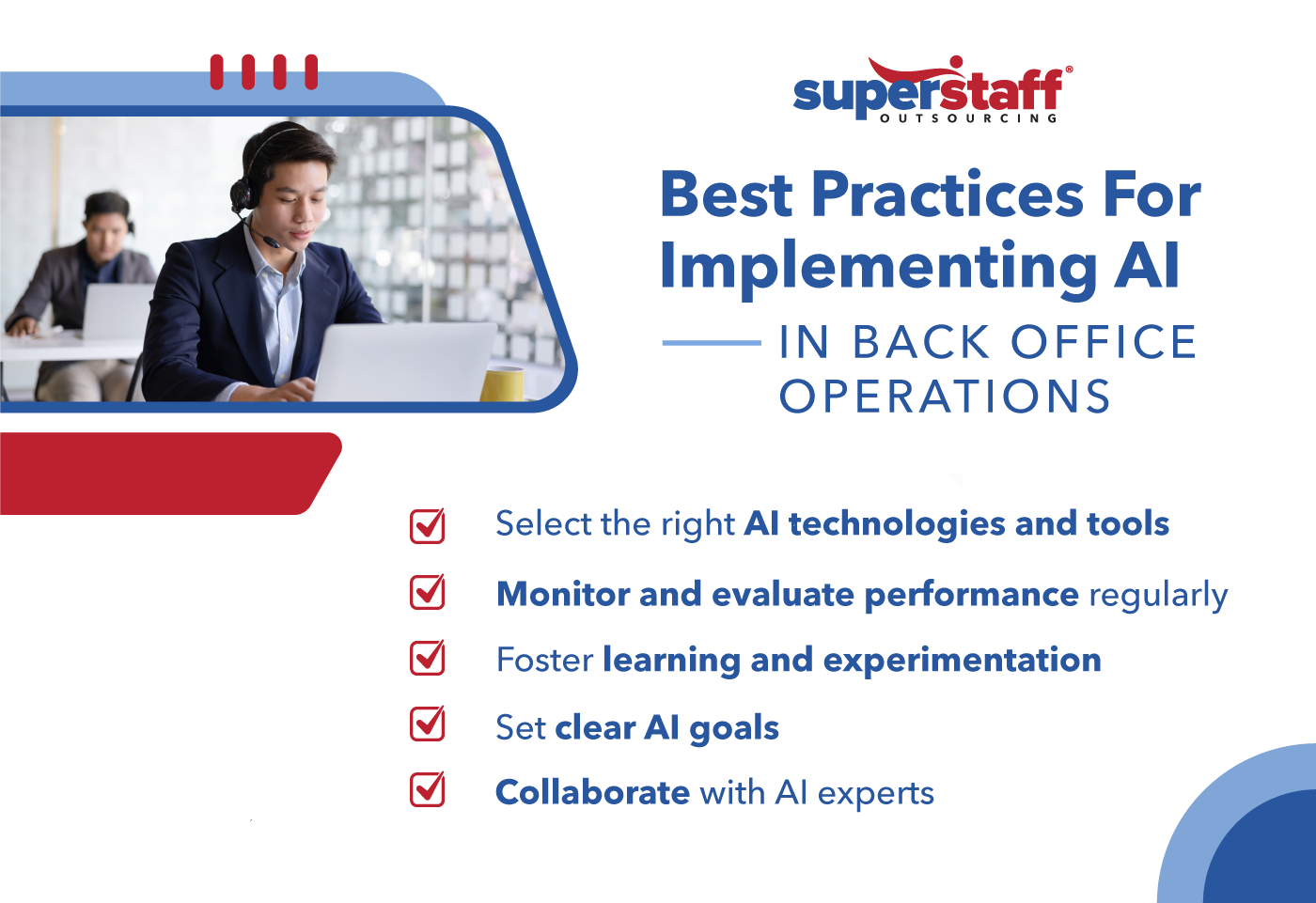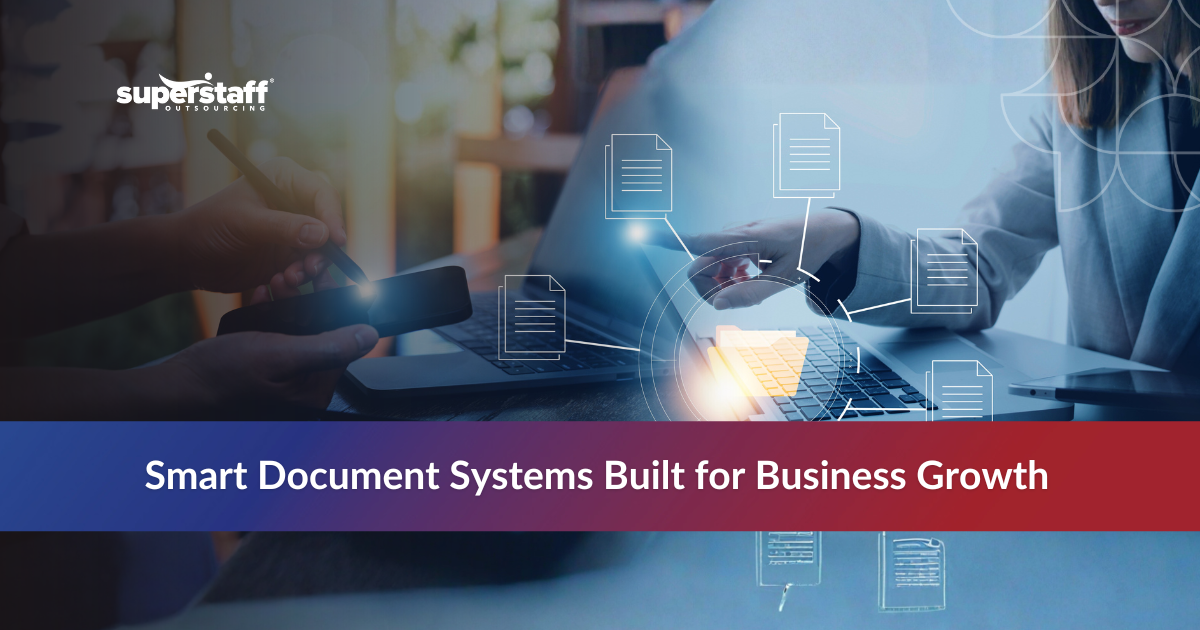
Artificial intelligence (AI) has emerged as a powerful tool for automating back-office operations in recent years. It allows businesses to streamline processes, improve efficiency, and enhance accuracy. Or, so we thought.
As more businesses integrate AI into their back office operations, lapses surface, and weaknesses become apparent. There’s a more logical approach: Automate mundane tasks with AI tools but have a human team of back-office support in control to achieve error-free output.
This resource article explores the opportunities and limitations of AI in back-office operations. Delve into the importance of human intervention and what significant roles a back office support team plays in the equation.
Opportunities for AI in Back Office Operations
Artificial intelligence (AI) has opened up a world of possibilities for businesses in today’s digital age. With its potential to revolutionize back-office operations, innovative firms that leverage AI-powered solutions are already achieving higher productivity levels for a much-needed edge in a hypercompetitive market.
Are you curious as to how AI is transforming the future of business? Let’s explore the key areas where you can maximize AI opportunities.
-
Automation of Repetitive Tasks
The power of advanced algorithms and machine learning allows AI systems to seamlessly handle repetitive tasks such as data entry, document processing, and invoicing. By integrating AI-driven automation into your operations, you can optimize resource allocation and elevate your team’s overall performance – ensuring that they’re working at their fullest potential in the most efficient manner possible.
Not only does this save time and minimize the risk of errors, but ultimately, it allows employees to refocus their energy toward more strategic and urgent tasks for maximum productivity. In fact, there is already an abundance of research supporting this claim – with one recent study revealing that a vast majority (61%) of workers have reported increased productivity as a direct result of integrating AI into their daily operations.
-
Data Processing and Analysis
Since AI systems are programmed with advanced algorithms that can handle large volumes of data, businesses can do significantly more work for less time – approximately they can automate 80% of physical work, 70% of data processing, and 64% of data collection tasks.
Through automated data analysis, AI also can identify patterns, anticipate anomalies, and predict trends that guide the decision of business leaders. Leveraging AI’s data processing and analysis can optimize back-office operations processes and help you gain a competitive advantage.
-
Intelligent Document Management
AI is also reshaping the way businesses manage their documents. By classifying, extracting, and organizing files, automation simplifies complex systems and improves the visibility and accessibility of data.
AI’s document management capability already plays a pivotal role in back-office operations. AI empowers organizations to achieve greater efficiency through streamlined workflows, improved collaboration, and regulatory compliance.
-
Predictive Maintenance
AI algorithms have also ushered in a new era of predictive maintenance. Gone are the days of reactionary maintenance, where businesses wait for issues to arise before taking action.
By delving into system data and historical maintenance records, AI identifies patterns and anomalies that alert to imminent equipment failures. With this foresight, businesses can take preventive measures, addressing maintenance needs to prevent downtime and eliminate the associated costs and disruptions.
AI Limitations and Challenges in Back Office Operations
AI has emerged as a transformative force, revolutionizing various aspects of back-office operations, but it’s worth noting that it still has certain limitations and challenges.
In this section, we will explore the potential drawbacks and limitations of AI in back-office tasks, emphasizing the importance of addressing issues such as data privacy, ethical concerns, and the necessity of human oversight in complex decision-making processes.
-
Technical Limitations
While AI has significantly transformed back-office operations, it still has a long way to go.
Since it cannot mirror human judgment and reasoning, AI systems may encounter challenges in accurately understanding complex or ambiguous situations.
Technical limitations can also arise from poor data quality, system incompatibility, and the lack of maintenance and updates. However, by combining the power of AI with human expertise, organizations can overcome these limitations.
For instance, AI automates basic calculations in accounting and bookkeeping, while human accountants provide expertise in handling complex scenarios. They possess critical thinking, interpretation skills, and professional judgment that allow them to identify errors, reconcile discrepancies, and ensure financial integrity.
The collaboration between AI and human expertise strikes a balance that optimizes efficiency, accuracy, and compliance in back-office operations, paving the way for sustained success.
-
Ethical Considerations
As AI becomes increasingly integrated into back-office operations, specific issues on data privacy, bias, and transparency arise. While AI tools offer valuable capabilities, addressing ethical challenges in human judgment and oversight is crucial.
For instance, accountants play a vital role in ensuring ethical compliance when handling accounts receivable and accounts payable. They take charge of crucial tasks such as verifying invoices, detecting potential fraud, and assessing payment terms for fairness. Accountants bring their expertise and ethical judgment to these processes, ensuring that financial transactions align with ethical standards and regulatory requirements to safeguard the organization’s reputation and integrity.
-
Data Security
While service providers prioritize strong security measures, such as encryption, firewalls, and access controls, to mitigate risks within AI systems, human intervention remains crucial in data security, especially in major outsourcing destinations like the Philippines.
Employees implement validation processes and maintain the integrity of the information being processed. Moreover, human intervention allows for the careful management of confidential data, preventing unauthorized disclosure and maintaining the trust of clients and customers.
By harnessing the strengths of both AI systems and human intervention, outsourcing firms can ensure the utmost data security and confidentiality for clients.
-
Skill Requirements and Workforce Adaptation
Despite the advancement of AI, nearly half of US employees admit they need training for its proper use – while this statistic may seem daunting, it should be no cause for concern.
Service providers already provide comprehensive training and upskilling programs to ensure employees have the necessary resources to work seamlessly with AI systems. With these initiatives in place, the transition becomes smoother, allowing employees to adapt to their new responsibilities confidently.
-
Integration Complexity
Even in the AI era, human employees still play a significant role in managing the integration process of automation technologies in back-office operations.
Back-office managers provide strategic oversight, ensuring the technology aligns with their goals. Their dedication to addressing data compatibility, system interoperability, and process interruption issues ensures the seamless adoption of AI tools into the workflow.
By recognizing the critical importance of human expertise in AI integration, businesses can successfully navigate the technological landscape effectively and harness AI’s full potential.
-
Cost and Return On Investment
As you embark on your AI journey, keep in mind that when it comes to strategic decisions, AI alone is not enough.
Human intervention is still crucial in overcoming challenges such as cost management and maximizing return on investment. Employees conduct thorough cost-benefit analyses, optimize resource allocation, and ensure that AI technology investments align seamlessly with the organization’s overarching goals.
Take auditors, for instance, who are particularly instrumental in evaluating the financial impact of AI implementation. Their expertise allows them to analyze the effectiveness of AI tools and identify areas for improvement. Through comprehensive audits and evaluations, they provide invaluable insights into the performance of AI technologies.
Best Practices For Implementing AI In Back Office Operations
In today’s cutthroat market, recognizing the significance of back-office operations is critical to stay ahead of the curve and capitalize on the advantages of AI technology. By embracing best practices and staying on top of emerging trends, businesses can harness the power of AI to unlock maximum back-office efficiency to fuel their growth and success.
-
Select the right AI technologies and tools.
When implementing AI solutions in your back office, aligning them with your specific needs and goals is crucial. Understand your organization’s challenges and pain points, and identify how AI can address those issues effectively.
Research is crucial in this phase of your AI journey. Understand the experiences of other organizations that have implemented similar AI technologies. Engage with AI experts who can provide valuable guidance and recommendations based on their expertise. Combining extensive research with expert insights empowers you to make educated choices and choose the best AI solutions for your back office.
-
Monitor and evaluate performance regularly.
Regular monitoring and evaluation are crucial to staying on top of your back-office operations.
By measuring the effectiveness, efficiency, and accuracy of your AI system, you can objectively assess its impact on your business. It enables you to identify and address any issues, bottlenecks, or emerging challenges that may negatively affect productivity.
Ultimately, staying proactive instead of reactionary will help prevent and mitigate potential disruptions in your streamlined workflow.
-
Foster learning and experimentation.
With the Philippine economy projected to reach an astounding $USD 800 billion by 2030, the future holds abundant opportunities for businesses to leverage AI technologies and drive innovation. As the economy grows, organizations will have increasingly more access to resources and support, making investments in AI solutions and outsourced BPO solutions such as customer service more convenient.
With this growth comes the opportunity to allocate more funds for AI training programs, research, and development. This, in turn, will foster a culture of exploration and innovation, allowing you to stay at the forefront of technological advancements.
By encouraging AI experimentation, you can embark on a transformative journey that will propel your business into a future of growth and success.
-
Set clear AI goals.
Defining your goals is the first step towards harnessing the power of AI in your back-office operations.
Without clear objectives, your AI initiatives may not be fruitful. By precisely articulating your goals, you create a roadmap that guides the success of your AI implementation process. This will allow you to align your AI initiatives with your organization’s overarching business strategy, ensuring that AI technologies are seamlessly integrated into your back-office operations for impactful outcomes.
-
Collaborate with AI experts.
Leveraging AI experts’ valuable knowledge, experience, and expertise will give you a huge competitive edge when integrating AI solutions into your back-office operations.
AI experts, such as BPO providers, can help you choose the right AI technologies and tools, optimize algorithms, and address any concerns that arise. Additionally, they can ensure you stay updated on the latest advancements and best practices in AI integration.
Offshoring a support team from a BPO company also comes with benefits such as cost-efficiency and round-the-clock support – giving you peace of mind knowing that there’s always someone there to assist you and your clients.
Balance Artificial Intelligence With Human Expertise
The potential for transformation and optimization with AI technologies is indeed immense. They offer unprecedented opportunities to streamline processes, enhance productivity, and drive innovation – but despite these advancements, the role of human intervention remains paramount.
While AI tools provide efficiency and accuracy, human comprehension, decision-making, and adaptability are indispensable. The key to success is balancing AI’s strengths and the expertise of an experienced core human team overseeing operations.
Consider the advantages of outsourcing non-core tasks to offshoring destinations such as the Philippines and nearshore call center services, particularly in countries like Colombia. Experience the support of skilled back-office human agents who understand customer needs and deliver exceptional service.
Ready to leap? With reputable call centers like Superstaff, you’ll work with experienced professionals who will propel your back-office operations to new heights. Contact us today and embark on a journey towards empowered back-office excellence!








